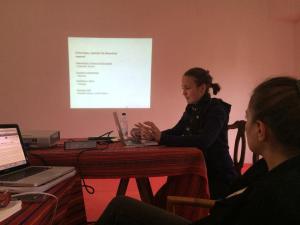
T-Node researcherd @ Summer Session 2014 in Linz, Austria
What do PhD graduates offer the labour market?
In a modern knowledge-based economy, highly educated people – knowledge workers – are in great demand. PhD graduates are, arguably, the most highly skilled and educated people in our culture and society.
In March 2000, at the Lisbon European Council, Towards a European research Area, COM (2000)6, 18.01.2000, Heads of State and Government set an ambitious goal for the European Union: to become ‘the most competitive and dynamic knowledge-based economy in the world, capable of sustainable economic growth with more and better jobs and great social cohesion’ by 2010.
A knowledge-based economy, one in which wealth and power are not constrained by the availability of raw materials, but depend instead on ability and know-how, is based on cultural progress.
The European Community has recognized the central value of knowledge and is actively promoting the concept of a knowledge-based economy, lifelong learning and improved skills.
The most highly educated and skilled group in our society consists in doctoral graduates. At the heart of a T-Node PhD is a question – a problem that must be identified, investigated and answered. New ideas are established and developed, they are tested through research, and debated at conferences, through publication and during the formal thesis examination. This debate is rigorous and demanding.
Destinations of PhD graduates in all disciplines
T-Node PhD graduates are more geographically mobile, and more fully employable than less highly qualified graduates. The T-Node PhD leads to careers in academe, research, cultural affairs, artistic installations or performances or research in general.
Popular career orientations also include library and museum work; editing and writing and public service professions. The graduates enter in a lifelong research that gives them the correct pace of change. The T-Node PhD graduates also take part in a highly recognized professional and cultural network that gives them new opportunities in terms of work and career.
Arts and humanities & arts and science
The arts and humanities in Europe are dominated by history, followed by literature, music, philosophy, archeology, art & design, and media studies.
Far from eschewing the study of esoteric or spiritual disciplines, it seeks to relate ancient, exotic, even archaic knowledge and practices to radically new ideas emerging at the forward edge of scientific research and speculation, and thereby to new forms of art and cultural expression. It seeks dynamic alternatives to the standard form of doctoral and post doctoral research while producing, if not exceeding, outcomes of comparable rigour, innovation and depth.
The Planetary Collegium is designed to produce new knowledge for the new millennium; new language, new systems, new structures, new behaviours, and new insights into the nature of mind, matter and human identity. It takes a constructive and pro-active approach to the social, technological and spiritual aspirations of the emerging planetary society, while sustaining a critical awareness of the retrograde forces and fields that inhibit social harmony and cultural transformation.
Employement rates for Art & Humanities PhD graduates are proportionally higher than for first and master degree, for academic diplomas and ‘lauree magistrali’ graduates.
Included in this category are self-employed Art & Humanities PhD graduates, who make up almost 10% of the whole.
Arts & Humanities PhD students usually shoulder significant teaching responsabilities in addiction to conducting their research.
PhD graduates can be employed as teaching professionals, as lecturers , professors or teaching assistants. The key positive features of an academic career are freedom and control , the academic can still organise his own time, decide what and how teach, and not kept under scrutiny as long as things are going well.
Lecturing positions head the list of most popular occupations, making up the majority of the teaching reported.
It is important for a teacher, lecturer, professor to have a real passion for knowledge and be committed to lifelong learning. It is an ethical career in which the work combines aesthetic and ethical values.
Research experience have a real value in the current education system and also in the society itself. But also the research area could not the primary or long-term interest, but can show how to apply research skills in different areas, and provide a welcome broadening after the narrowness of the PhD. Popular careers further away for the academic career track include library and museum work; editing and writing and public service professions.